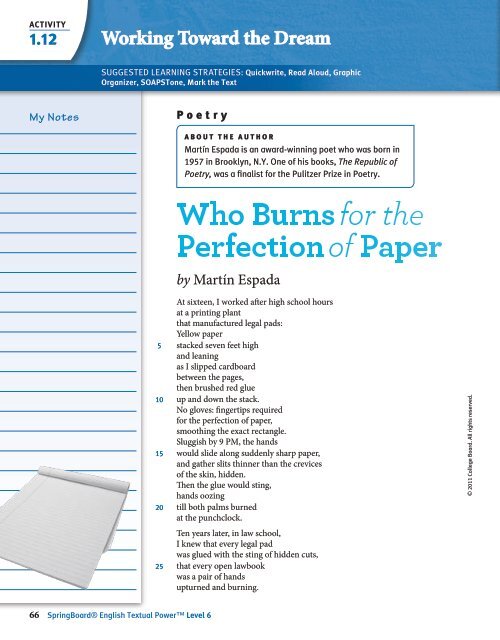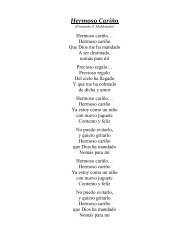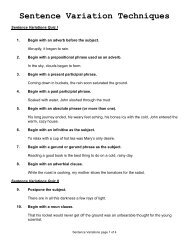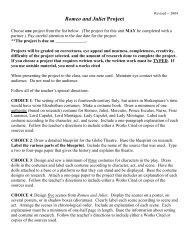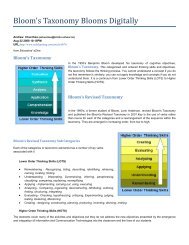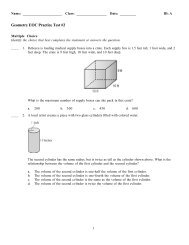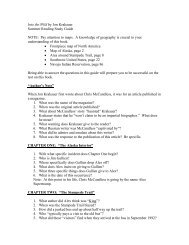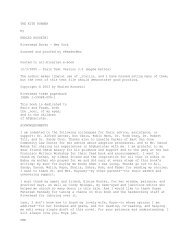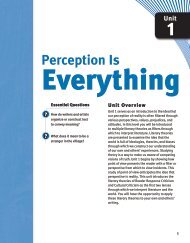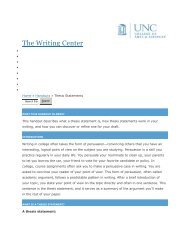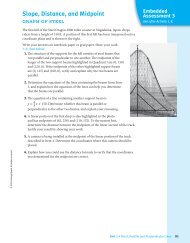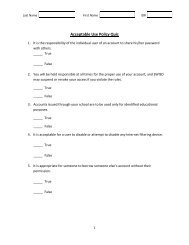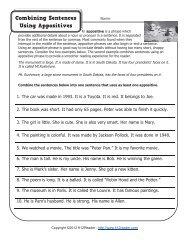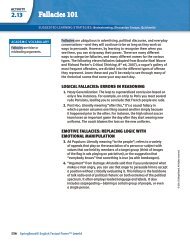Working Toward the Dream - Southwest High School
Working Toward the Dream - Southwest High School
Working Toward the Dream - Southwest High School
Create successful ePaper yourself
Turn your PDF publications into a flip-book with our unique Google optimized e-Paper software.
Activity<br />
1.12<br />
<strong>Working</strong> <strong>Toward</strong> <strong>the</strong> <strong>Dream</strong><br />
SUGGESTED Learning Strategies: Quickwrite, Read Aloud, Graphic<br />
Organizer, SOAPSTone, Mark <strong>the</strong> Text<br />
My Notes<br />
P o e t r y<br />
A b o u t t h e A u t h o r<br />
Martín Espada is an award-winning poet who was born in<br />
1957 in Brooklyn, N.Y. One of his books, The Republic of<br />
Poetry, was a finalist for <strong>the</strong> Pulitzer Prize in Poetry.<br />
5<br />
10<br />
15<br />
20<br />
25<br />
by Martín Es pada<br />
At sixteen, I worked after high school hours<br />
at a printing plant<br />
that manufactured legal pads:<br />
Yellow paper<br />
stacked seven feet high<br />
and leaning<br />
as I slipped cardboard<br />
between <strong>the</strong> pages,<br />
<strong>the</strong>n brushed red glue<br />
up and down <strong>the</strong> stack.<br />
No gloves: fingertips required<br />
for <strong>the</strong> perfection of paper,<br />
smoothing <strong>the</strong> exact rectangle.<br />
Sluggish by 9 PM, <strong>the</strong> hands<br />
would slide along suddenly sharp paper,<br />
and ga<strong>the</strong>r slits thinner than <strong>the</strong> crevices<br />
of <strong>the</strong> skin, hidden.<br />
Then <strong>the</strong> glue would sting,<br />
hands oozing<br />
till both palms burned<br />
at <strong>the</strong> punchclock.<br />
Ten years later, in law school,<br />
I knew that every legal pad<br />
was glued with <strong>the</strong> sting of hidden cuts,<br />
that every open lawbook<br />
was a pair of hands<br />
upturned and burning.<br />
© 2011 College Board. All rights reserved.<br />
66 SpringBoard® English Textual Power Level 6
Activity 1.12<br />
continued<br />
As you read <strong>the</strong> poem, “Who Burns for <strong>the</strong> Perfection of Paper,”<br />
complete <strong>the</strong> following chart:<br />
Choose a statement that reflects<br />
what <strong>the</strong> speaker learned from his<br />
work.<br />
“Who Burns for <strong>the</strong> Perfection of Paper”<br />
Write a description, and <strong>the</strong>n<br />
create a visual of <strong>the</strong> last image of<br />
<strong>the</strong> poem.<br />
What do you think <strong>the</strong> title means?<br />
© 2011 College Board. All rights reserved.<br />
Write an interpretive statement about <strong>the</strong> speaker’s realization.<br />
Unit 1 • The American <strong>Dream</strong> 67
Activity 1.12<br />
continued<br />
<strong>Working</strong> <strong>Toward</strong> <strong>the</strong> <strong>Dream</strong><br />
Complete <strong>the</strong> following SOAPSTone to analyze <strong>the</strong> interview “Roberto<br />
Acuna Talks About Farm Workers,” recorded by Studs Terkel.<br />
Speaker<br />
What can you say about <strong>the</strong> speaker<br />
based on references in <strong>the</strong> text? Is<br />
race, gender, class, or age important?<br />
Occasion<br />
What issues may have motivated <strong>the</strong><br />
speaker to think about <strong>the</strong> incident<br />
or occasion?<br />
Audience<br />
Who is being addressed? Identify<br />
some characteristics of <strong>the</strong> audience.<br />
Purpose<br />
What is <strong>the</strong> message and how does<br />
<strong>the</strong> author want <strong>the</strong> audience to<br />
respond?<br />
Subject<br />
What is <strong>the</strong> focus? The subject can be<br />
stated by using a few words.<br />
© 2011 College Board. All rights reserved.<br />
Tone<br />
Using textual support, how would<br />
you describe <strong>the</strong> overall tone of <strong>the</strong><br />
passage?<br />
68 SpringBoard® English Textual Power Level 6
N o n f i c t i o n Activity 1.12<br />
continued<br />
from <strong>Working</strong><br />
by Studs Terkel<br />
My Notes<br />
A b o u t t h e A u t h o r<br />
Studs Terkel (1912–2008), famous Chicago radio<br />
broadcaster, interviewer, and writer, was born Louis<br />
Terkel in New York. A Pulitzer Prize winner, Terkel wrote<br />
more than two dozen books, but he is probably most<br />
famous for his oral histories.<br />
© 2011 College Board. All rights reserved.<br />
I walked out of <strong>the</strong> fields two years ago. I saw <strong>the</strong> need to change <strong>the</strong><br />
California feudal system, to change <strong>the</strong> lives of farm workers, to make <strong>the</strong>se<br />
huge corporations feel <strong>the</strong>y’re not above anybody. I am thirty-four years old<br />
and I try to organize for <strong>the</strong> United Farm Workers of America….<br />
If you’re picking lettuce, <strong>the</strong> thumbnails fall off ’cause <strong>the</strong>y’re banged on<br />
<strong>the</strong> box. Your hands get swollen. You can’t slow down because <strong>the</strong> foreman<br />
sees you’re so many boxes behind and you’d better get on. But people would<br />
help each o<strong>the</strong>r. If you’re feeling bad that day, somebody who’s feeling pretty<br />
good would help. Any people that are suffering have to stick toge<strong>the</strong>r, whe<strong>the</strong>r<br />
<strong>the</strong>y like it or not, whe<strong>the</strong>r <strong>the</strong>y be black, brown, or pink….<br />
I began to see how everything was so wrong. When growers can have<br />
an intricate watering system to irrigate <strong>the</strong>ir crops but <strong>the</strong>y can’t have<br />
running water inside <strong>the</strong> houses of workers. Veterinarians tend to <strong>the</strong><br />
needs of domestic animals but <strong>the</strong>y can’t have medical care for <strong>the</strong> workers.<br />
They can have land subsidies 1 for <strong>the</strong> growers but <strong>the</strong>y can’t have adequate<br />
unemployment compensation for <strong>the</strong> workers. They treat him like a farm<br />
implement. In fact, <strong>the</strong>y treat <strong>the</strong>ir implements better and <strong>the</strong>ir domestic<br />
animals better. They have heat and insulated 2 barns for <strong>the</strong> animals but <strong>the</strong><br />
workers live in beat-up shacks with no heat at all.<br />
Illness in <strong>the</strong> fields is 120 percent higher than <strong>the</strong> average rate for<br />
industry. It’s mostly back trouble, rheumatism, and arthritis, because of<br />
<strong>the</strong> damp wea<strong>the</strong>r and <strong>the</strong> cold. Stoop labor is very hard on a person.<br />
Tuberculosis is high. And now because of <strong>the</strong> pesticides, we have many<br />
respiratory diseases.<br />
The University of California at Davis had government experiments with<br />
pesticides and chemicals. They get a bigger crop each year. They haven’t any<br />
&<br />
Grammar Usage<br />
Repeating a grammatical<br />
structure, even one as<br />
simple as an infinitive<br />
phrase, creates rhythm and<br />
emphasis through parallel<br />
structure. Notice that<br />
Roberto Acuna emphasizes<br />
his commitment with<br />
parallel infinitive phrases<br />
modifying need: “I saw<br />
<strong>the</strong> need to change <strong>the</strong><br />
California feudal system,<br />
to change <strong>the</strong> lives of<br />
farm workers, to make<br />
<strong>the</strong>se huge corporations<br />
feel <strong>the</strong>y’re not above<br />
anybody.”<br />
1<br />
subsidy: a grant or contribution of money<br />
2<br />
insulate: to surround or fill with material that prevents <strong>the</strong> passage of heat or cold<br />
Unit 1 • The American <strong>Dream</strong> 69
Activity 1.12<br />
continued<br />
<strong>Working</strong> <strong>Toward</strong> <strong>the</strong> <strong>Dream</strong><br />
Word<br />
Connections<br />
Pesticide is a hybrid word<br />
from <strong>the</strong> English word pest<br />
and –cide, which comes<br />
from <strong>the</strong> Latin word cidium<br />
meaning “a killing.” O<strong>the</strong>r<br />
words based on cidium<br />
include homicide and<br />
suicide.<br />
My Notes<br />
regard as to what safety precautions are needed. In 1964 and ’65, an airplane<br />
was spraying <strong>the</strong>se chemicals on <strong>the</strong> fields. Spraying rigs <strong>the</strong>y’re called.<br />
Flying low, <strong>the</strong> wheels got tangled in <strong>the</strong> fence wire. The pilot got up, dusted<br />
himself off, and got a drink of water. He died of convulsions. The ambulance<br />
attendants got violently sick because of <strong>the</strong> pesticide he had on his person. A<br />
little girl was playing around a sprayer. She stuck her tongue on it. She died<br />
instantly.<br />
These pesticides affect <strong>the</strong> farm worker through <strong>the</strong> lungs. He brea<strong>the</strong>s it<br />
in. He gets no compensation. All <strong>the</strong>y do is say he’s sick. They don’t investigate<br />
<strong>the</strong> cause.<br />
There were times when I felt I couldn’t take it anymore. It was 105 in <strong>the</strong><br />
shade and I’d see endless rows of lettuce and I felt my back hurting…. I felt<br />
<strong>the</strong> frustration of not being able to get out of <strong>the</strong> fields. I was getting ready to<br />
jump any foreman who looked at me cross-eyed. But until two years ago, my<br />
world was still very small.<br />
I would read all <strong>the</strong>se things in <strong>the</strong> papers about Cesar Chavez and I<br />
would denounce 3 him because I still had that thing about becoming a first<br />
class patriotic citizen. In Mexicali 4 <strong>the</strong>y would pass out leaflets and I would<br />
throw ’em away. I never participated. The grape boycott didn’t affect me much<br />
because I was in lettuce. It wasn’t until Chavez came to Salinas 5 where I was<br />
working in <strong>the</strong> fields, that I saw what a beautiful man he was. I went to this<br />
rally, I still intended to stay with <strong>the</strong> company. But something — I don’t<br />
know — I was close to <strong>the</strong> workers. They couldn’t speak English and wanted<br />
me to be <strong>the</strong>ir spokesman in favor of going on strike. I don’t know — I just<br />
got caught up with it all, <strong>the</strong> beautiful feeling of solidarity.<br />
You’d see <strong>the</strong> people on <strong>the</strong> picket lines at four in <strong>the</strong> morning, at <strong>the</strong><br />
camp fires, heating up beans and coffee and tortillas. It gave me a sense of<br />
belonging. These were my own people and <strong>the</strong>y wanted change. I knew this is<br />
what I was looking for. I just didn’t know it before.<br />
My mom had always wanted me to better myself. I wanted to better<br />
myself because of her. Now when <strong>the</strong> strikes started, I told her I was going<br />
to join <strong>the</strong> union and <strong>the</strong> whole movement. I told her I was going to work<br />
without pay. She said she was proud of me. (His eyes glisten. A long, long<br />
pause.) See, I told her I wanted to be with my people. If I were a company<br />
man, no one would like me anymore. I had to belong to somebody and this<br />
was it right here. She said, “I pushed you in your early years to try to better<br />
yourself and get a social position. But I see that’s not <strong>the</strong> answer. I know I’ll be<br />
proud of you.”<br />
All kinds of people are farm workers, not just Chicanos. Filipinos started<br />
<strong>the</strong> strike. We have Puerto Ricans and Appalachians too, Arabs, some<br />
© 2011 College Board. All rights reserved.<br />
3<br />
denounce: to openly condemn or censure<br />
4<br />
Mexicali (mek´ si kal´ ē): capital of <strong>the</strong> Mexican state of Baja California Norte<br />
5<br />
Salinas (sә lē'nәs): city in west central California<br />
70 SpringBoard® English Textual Power Level 6
Activity 1.12<br />
continued<br />
© 2011 College Board. All rights reserved.<br />
Japanese, some Chinese. At one time <strong>the</strong>y used us against each o<strong>the</strong>r. But now<br />
<strong>the</strong>y can’t and <strong>the</strong>y’re scared, <strong>the</strong> growers. They can organize conglomerates.<br />
Yet when we try organization to better our lives, <strong>the</strong>y are afraid. Suffering<br />
people never dreamed it could be different. Cesar Chavez tells <strong>the</strong>m this and<br />
<strong>the</strong>y grasp <strong>the</strong> idea — and this is what scares <strong>the</strong> growers.<br />
Now <strong>the</strong> machines are coming in. It takes skill to operate <strong>the</strong>m. But<br />
anybody can be taught. We feel migrant workers should be given <strong>the</strong> chance.<br />
They got one for grapes. They got one for lettuce. They have cotton machines<br />
that took jobs away from thousands of farm workers. The people wind up in<br />
<strong>the</strong> ghettos of <strong>the</strong> cities, <strong>the</strong>ir culture, <strong>the</strong>ir families, <strong>the</strong>ir unity destroyed.<br />
We’re trying to stipulate 6 it in our contract that <strong>the</strong> company will not use<br />
any machinery without <strong>the</strong> consent of <strong>the</strong> farm workers. So we can make<br />
sure <strong>the</strong> people being replaced by <strong>the</strong> machines will know how to operate <strong>the</strong><br />
machines.<br />
<strong>Working</strong> in <strong>the</strong> fields is not in itself a degrading job. It’s hard, but if you’re<br />
given regular hours, better pay, decent housing, unemployment, and medical<br />
compensation, pension plans — we have a very relaxed way of living. But<br />
growers don’t recognize us as persons. That’s <strong>the</strong> worst thing, <strong>the</strong> way <strong>the</strong>y<br />
treat you. Like we have no brains. Now we see <strong>the</strong>y have no brains. They have<br />
only a wallet in <strong>the</strong>ir head. The more you squeeze it <strong>the</strong> more <strong>the</strong>y cry out.<br />
If we had proper compensation we wouldn’t have to be working seventeen<br />
hours a day and following <strong>the</strong> crops. We could stay in one area and it would<br />
give us roots. Being a migrant, it tears <strong>the</strong> family apart. You get in debt. You<br />
leave <strong>the</strong> area penniless. The children are <strong>the</strong> ones hurt <strong>the</strong> most. They go to<br />
school three months in one place and <strong>the</strong>n on to ano<strong>the</strong>r. No sooner<br />
do <strong>the</strong>y make friends, <strong>the</strong>y are uprooted again. Right here, your<br />
childhood is taken away. So when <strong>the</strong>y grow up, <strong>the</strong>y’re looking<br />
for this childhood <strong>the</strong>y have lost.<br />
If people could see — in <strong>the</strong> winter, ice on <strong>the</strong> fields.<br />
We’d be on our knees all day long. We’d build fires and<br />
warm up real fast and go back onto <strong>the</strong> ice. We’d be<br />
picking watermelons in 105 degrees all day long. When<br />
people have melons or cucumber or carrots or lettuce,<br />
<strong>the</strong>y don’t know how <strong>the</strong>y got on <strong>the</strong>ir table and <strong>the</strong><br />
consequences to <strong>the</strong> people who picked it. If I had<br />
enough money, I would take busloads of people out<br />
to <strong>the</strong> fields and into <strong>the</strong> labor camps. Then <strong>the</strong>y’d<br />
know how that fine salad got on <strong>the</strong>ir table.<br />
Word<br />
Connections<br />
The Latin term quid pro<br />
quo means an equal<br />
exchange or substitution.<br />
For example, in a work<br />
situation, <strong>the</strong> employee<br />
receives wages, and <strong>the</strong><br />
employer receives <strong>the</strong><br />
work done. Whe<strong>the</strong>r <strong>the</strong><br />
two are of equal value<br />
is sometimes a point of<br />
dispute.<br />
My Notes<br />
6<br />
stipulate: to lay down a condition of an agreement<br />
Unit 1 • The American <strong>Dream</strong> 71


